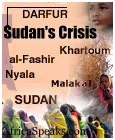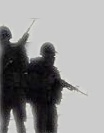 |






 AfricaSpeaks Weblog AfricaSpeaks Weblog
 Rootswomen Weblog Rootswomen Weblog
 Rootsie's Weblog Rootsie's Weblog
|
Saddam blasts nations considering Iraq attack
Posted: Friday, August 9, 2002
By Robin Wright, Los Angeles Times
WASHINGTON — In a defiant speech to his nation, President Saddam Hussein warned yesterday that the United States and any other nations that attempt to attack Iraq would face "disgraceful" military failure and a massive loss of life that would force them to "carry their coffins on their backs."
The Iraqi leader's televised address — an appeal to audiences both at home and abroad — was his first public response to the growing threat of military confrontation with the United States.
"All empires and bearers of the coffin of evil, whenever they mobilized their evil against the Arab world or against the Muslim world, they were themselves buried in their own coffin, with their sick dreams and their arrogance and greed," he said.
The Bush administration dismissed the speech as insignificant, with State Department spokesman Philip Reeker calling it "bluster from an internationally isolated dictator, demonstrative yet again that his regime shows no intention to live up to its obligations under U.N. Security Council resolutions."
Yet the speech offered telling insights into the current mood of the Baghdad regime. Despite the tough talk, analysts said, the speech hinted at a new fear within Iraq's leadership about U.S. plans to oust Saddam, as the war of nerves between the two nations heats up.
The speech, delivered on the anniversary of the end of the 1980-88 war between Iraq and Iran, resonated on three levels, analysts said.
It sought first to evoke what is viewed in Baghdad as a victory, playing particularly to the Iraqi military — arguably the most important element in society in determining whether he can survive a foreign onslaught.
Clad in a suit, instead of his usual general's uniform, Saddam stressed the survival of his regime through assorted challenges. He boasted that the call to stand up to any aggressor was backed "by everyone confronting the enemies with a gun, a cannon, on a tank, in a plane, or on a naval boat, by millions of men among our troops."
But, in fact, the military is the big question mark, and his concern about its loyalty is now evident.
"Saddam has been briefed on the content of plans leaked to the press, many of which say explicitly that the military and the tribes will defect and come over to support the United States," said Judith Yaphe, a former intelligence analyst who is now a senior fellow at the National Defense University in Washington.
The speech played to fierce Iraqi nationalism, with Saddam noting that Iraqis always stood together whenever "the horns of aggression loomed large against us."
His remarks were directed to the heart of U.S. strategy in the run-up to a confrontation, analysts said.
"American strategy is to separate Saddam from the Iraqi people, to show the people that they can support Iraq without supporting Saddam. Saddam knows that's his weakness, so to the extent he can wrap himself in the Iraqi flag and say, 'An attack on me is an attack on all of you,' that is now his defense," said Charles Duelfer, former chief U.N. weapons inspector in Iraq, now a visiting scholar at the Center for Strategic and International Studies, a Washington public-policy center.
Second, the speech was aimed at the Arab and Muslim worlds — reflecting their historical encounters with the West — in an attempt to prevent them from succumbing to U.S. pressure to provide assistance in confronting the Baghdad regime.
Ignominious defeat "is the inevitable outcome awaiting all those who try to aggress against Arabs and Muslims," Saddam said. Frequently invoking the Muslim faith, he said that belief in God always helped the faithful "to prevail over injustice."
In an interesting twist, Saddam did not give this speech on Aug. 2, the anniversary of his 1990 invasion of Kuwait, although he has chosen that date for remarks in the past. That war deeply divided the Arab world, with countries such as Egypt and Syria dispatching troops to force an Iraqi withdrawal. Instead, he picked the anniversary of a war against Iran, a non-Arab country that many Arab nations fear.
Finally, he attempted in his speech to divide the United States from the rest of the world.
While he never specifically mentioned the United States, he made obvious references to "the enemy" and "the forces of evil," the latter a play on Bush's description of Iraq as a member of the "axis of evil."
The White House reacted to the speech by calling for greater compliance with the United Nations.
"The Iraqi government needs to comply with the responsibilities it agreed to at the end of the Gulf War" in 1991, said spokesman Scott McClellan. Those include allowing international inspectors to determine whether Iraq is creating chemical, biological or nuclear weapons.
Iraq has barred the inspectors since 1998.
Iraq has held several meetings with the United Nations in recent months to discuss the key outstanding issue of letting weapons inspectors return. It recently proposed more. But U.S. officials maintain the dialogue advocated in Baghdad never yields concrete action. In any case, the Bush administration has made toppling Saddam's government a goal aside from the issue of readmitting inspectors.
Saddam's speech came on the eve of talks between the Bush administration and several Iraqi opposition groups to discuss the possible ouster of the Iraqi leader and the steps that would be required to build a democratic government.
Iraqi National Congress (INC) spokesman Sharif Ali, one of those meeting at the State Department today, said he does not foresee any need for a prolonged U.S. military effort because support for Saddam among Iraqis has evaporated.
Ali, who is related to Iraq's last king and describes himself as a constitutional monarchist, is expected to be joined by five other INC leaders, all civilians, including the head of the London-based organization, Ahmed Chalabi.
Representatives of Saddam's opponents from the Kurdish area of Iraq also will attend.
Ali said the INC, which has suffered from factionalism in the past, will speak to the administration with a "united voice" during today's meeting.
Information from The Washington Post and The Associated Press is included in this report.
Reproduced from:
http://seattletimes.nwsource.com/html/n
ationworld/134509926_iraq09.html
Copyright © 2002 The Seattle Times Company
 Printer friendly version Printer friendly version
 Send page by E-Mail Send page by E-Mail
|








